If you would like more than 8 samples, please contact a trader directly.
Cart
A trader will contact you with shipping and payment options after checkout. Please note: free samples are provided to commercial roasting businesses only.
Uganda is where Crop to Cup got it’s start 15 years ago. We started with washed coffees from Mt. Elgon in the East, moved to floated naturals in the western Rwenzoris, and in the past two years started supporting supply-chains on the northern border with Congo and Sudan. Year by year we come back to push the needle on quality, and have seen scores improve from 82 to 86 in all three areas. But that has been our ceiling.
Until now.
Our visit in 2020 showed us that sometimes situations can change quickly. In this case we have witnessed a fluorescence of quality-minded independents, young organizations who have set out to break the ceiling on what was previously possible.
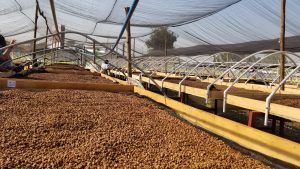
HARVEST OVERVIEW. Record-breaking rains from September to delayed the harvest by a full month, left cherries un-ripened on the trees, caused massive mudslides and forced all coffee to move down-mountain for drying. But these rains ended with new year, and ended up giving an incredible advantage to anyone sourcing from the highest altitudes – like us.
Larger companies closed their operations by December 15th with full warehouses; they are counting on milling to make the difference between commodity and specialty. But as the sun came out in January so did smaller buyers, and what they (we) found is an open playground full of the best coffee we have yet to see in Uganda.
Collections are still coming in, and will continue through mid-February. In Elgon, competition for cherry has pushed up prices- and standards – for cherry selection, meaning that what is coming in is being handled better than ever before. In the west, interest in specialty naturals has pushed prices up from blender levels (-60c below market) to minimum offers of 160c over market for anything of quality. In the north, investments by multi-nationals, with funds from the international development community (namely ABI Trust) have forged a new specialty profile – best described as ‘orange creamsicle’.
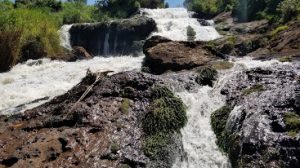
WHITE NILE is new to specialty coffee. In an area known as the Alur Kingdom, inhabited by the Luo people, coffee and people flow freely across state lines. This is the North-Eastern corner of Uganda, a place where SL varietals took root nearly 100 years ago, and which have never been replaced. Initially, coffee from here was sold as a general Uganda FAQ – mostly for blenders and instant coffees. Coffee is collected as ‘sub-prime’, ‘ordinary’ and ‘super-ordinary’, roughly divided into thirds. Two years ago we zoomed in on districts we knew to have higher quality, asked for a fourth ‘super-premium’ category, and started seeing results. This year we helped to open a quality training center – a roaster, green grading and cupping lab – so that the language of quality could get pushed even closer to the farm.
RWENZORI is a mountain range further south, but also on the Uganda/Congo border. This is where we find Bukonzo Organics, one of the few surviving cooperatives, and one of the few in the region to work on washed coffees. This is also the home for Drugars – Dried Ugandan Naturals – which only recently have been treated as specialty. Investments by nonprofits (Lutheran World Relief & ABI Trust) have revolutionized the way that coffee is viewed, processed, and sold in this area. For those looking at big-bodied naturals that are more fruit-lingering than fruit forward, this is the place to look.
ELGON is the traditional home to Ugandan specialty Arabica. Separated by tribe and region into Bugisu (who occupy most of the mountain) and Sebei (who live in Kapchorwa, Sipi Falls area), one can find profiles that range from effervescent lime to deep chocolates to tropical fruits – and many combinations therein. This is also where Crop to Cup got it’s start back in 2005 by registering farmer groups, revitalizing washing stations, and separating for the region’s first specialty exports in decades. Since then the world has caught on, and Uganda’s reputation has improved dramatically as a significant source for specialty. Competition for volumes have undermined traditional cooperative structures, leaving a mountain full of individuals. But in the past two years we’ve seen local independents rise up, with their neighbors, to seek specialty markets of their own. These groups operate outside of mainstream exporters, and without the benefit of their resources. But trust, leadership, hustle, and the passionate investment of a few select individuals has brought new options to market for those who care to take a bet on the underdog.
OUR APPROACH. This is where we come in.
Our 2020 import plan looks to support these emerging groups, which we’ve come to see as the ‘heart, soul and head’ of Ugandan coffee, and the future of specialty on Mt. Elgon.
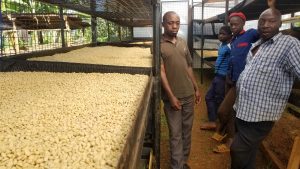
Mountain View Coffee has brought in western cuppers, Colombian production managers, central drying and pulping stations, and even weather stations to monitor every aspect of their coffee. Their operation is purely organic, and built from the primary societies of the now defunct Gumutindo Coopreative.
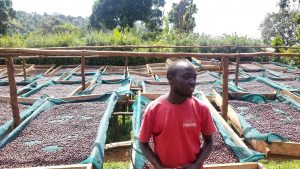
Zukuku Bora has brought their community development work into coffee, using their network and skills in mobilization to promote the most immaculate of cherry collection. Their operation is an offshoot of a nonprofit, Jenga CDO, and run entirely by young Ugandans.
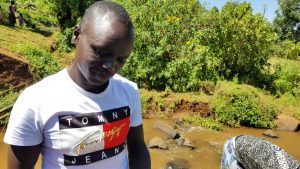
Mamboo Coffee has brought decades of experience and relationships to cherry-pick the very best farmers on the mountain, and to make them better. Their operation is centered on the passion and expertise of Dison Kareng, and held together by the decades of trust he’s built in his community.
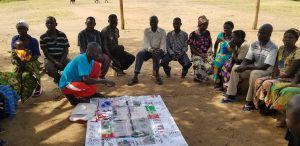
Outisde of Elgon, we are continuing to work with Bukonzo Organics in Rwenzori – recent beneficiaries of a Luther World Relief sponsored impact investment. We are also expanding our support of the Kyagalanyi owned washing station in Erussi, who are trying to raise the bar on what’s possible from this region.
2020 VISIT SUMMARY. Halfway through our 2020 visit we realized that it could best be described as a heist movie, one where we’re getting the gang together. We met with friends new and old, from exporters, mills, financiers, cuppers and farmers. The job – building a bench to support independents as they try to grow their operations to export scale, and get great coffees to market. The result – two new coffee shops in farmer communities – which act as headquarters for these emerging organizations. Contracts leveraged for pre-crop financing and a five-fold growth of volumes. Experiments with processing (black honey, washed naturals, and fertilizers). And plans to expand even more for next year with new washing stations.
TIMING. Those who come first (in exports) may come last (in quality). We are targeting peak collections from the highest altitude zones in every area we work. This gives us tremendous advantages in selecting the very best coffees – even within a cooperative structure where separation can become political. And, this year, it gave us advantages in terms of weather and competition from larger buyers, who largely stopped buying before the new year.
>Mt. Elgon: February samples, April/May shipment, June/July arrivals (post-Covid correction; July – September arrivals)
>Rwenzori & White Nile: November/December samples, January/February shipments, March/April arrivals.
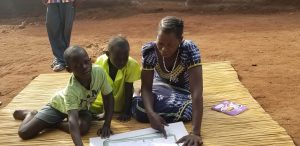
NEWS. Headlines in Uganda are dominated by the upcoming 2021 elections, where President Museveni is expected to take yet another term in office over upstart rapper-turned-politician Bobi Wine. Mudslides in Mt. Elgon wiped our over 1,400 homes this harvest season, displacing many, many of whom will never be able to move back. In coffee, cherry price have outpaced parchment prices; normally the ratio is 5 KG cherry = 1 KG parchment, and the price had been the same. Now cherries are priced more on a 4:1 ratio, encouraging farmers to deliver to wet-mills who have been better able to control processing – and drying times. Talent from all over the world (mainly Colombia) has come over to oversee the production o honey and natural-processed coffees. And Mountain View Coffee brought organics back to Mt. Elgon.
CURRENT CHALLENGES. Weather is the number one challenge faced by farmers this season. Prolonged rains pushed back the harvest, lead to cherries lingering on trees – many of which never turned red – and facilitated the spread of both Coffee Berry Disease and Leaf Rust. Drying was also a challenge as groups ran out of drying space and had to scramble to find secondary sites down-mountain. For independents the cost of capital remains a barrier; local interest rates hover around 28%, compared to the less than 2% rates obtained by multi-nationals. And in it all Ugandan specialty struggles to be taken seriously by the US market, meaning that those who do persevere have a hard time finding prices to reward their efforts.
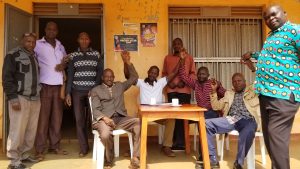
OUTCOMES. Looking back, the 2020 season will be viewed as a fresh start for specialty in Uganda. New groups have risen to the challenge and, with the support of many, are getting their coffees to market for the first time. This makes it the perfect time to get involved for any roaster who is looking to get in on ground floor in what will be the future of specialty in Uganda.
For Crop to Cup, the 2020 season is all the more rewarding due to the depth of our relationships there. Not only is it satisfying to see the right people doing the right things, but we now know that the 86 point ceiling is artificial, and soon to be broken. In Mt. Elgon there’s no reason why quality can’t match that of Kenya, located just on the other side of the mountain, with the same language, trees and terroir. In the north, heirloom varietals combine with low production to give coffee the conditions it needs to succeed. Aligning incentives towards this end is what we enjoy doing most. In Rwenzori we’ve been happy to see Bukonzo Organics adopt a business mindset, expand their production and their capabilities to compete.